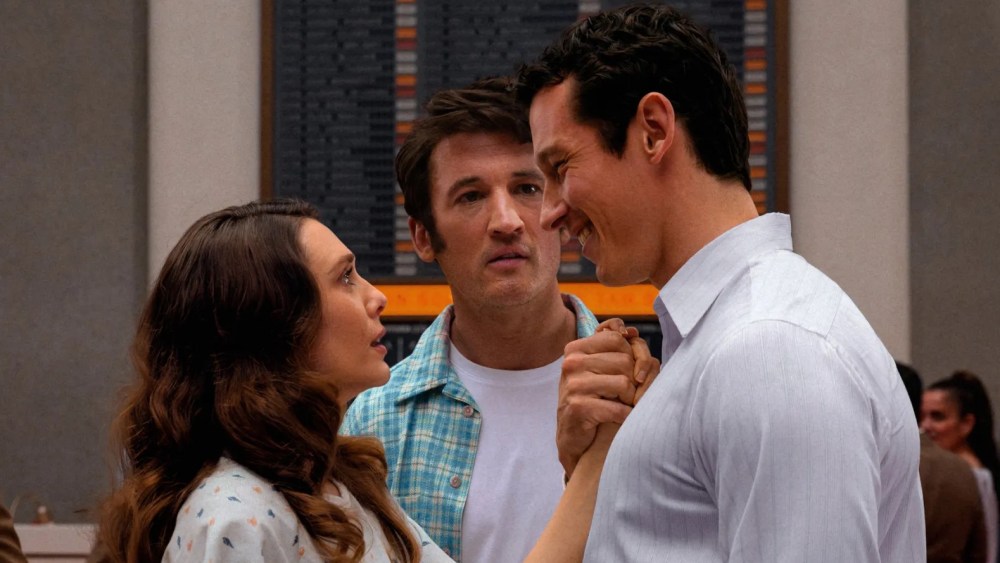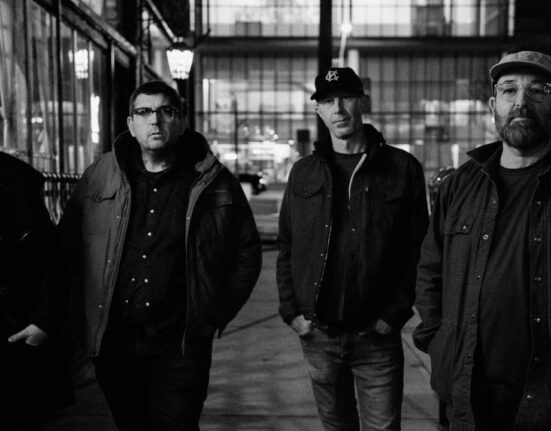Afterlife movies tend to be amiable in a goofy way, one that ends up tamping down the stakes. Once you’ve arrived in the afterlife, you aren’t going anywhere, and you’re not going to die (not again!). There’s always that moment, early on, when the hero or heroine realizes what’s happened to them and is cosmically jarred, hit by the awareness that there’s no going back. The thing is: The afterlife, in movies, doesn’t look all that different from regular life; that’s why most of these movies are comedies. (That’s the underlying joke.) In Albert Brooks’ “Defending Your Life,” Brooks’ deceased advertising executive visits the afterlife cafeteria only to be served the best omelette he’s ever tasted. If that’s how good the food is, how bad could things get?
“Eternity” is an afterlife rom-com that features three (dead) characters who’ve reverted, in the afterlife, to being their younger, happier selves. There’s Larry (Miles Teller), who was an aging crank when we first met him, only now that he’s died, choking on a morsel of snack food, we can see the vital and handsome if rather ordinary 35ish fellow he once was. His wife, Joan, shows up shortly afterward — she succumbed to cancer, but now she’s played by the vibrant Elizabeth Olsen. These two land in a waiting room that’s like a brightly lit train station, where they’re each assigned to an AC (afterlife coordinator), and they have to decide which eternity zone they want to spend the rest of time in. There are a lot of choices: Casino World, Celebrity World, Food World, Smokers’ World (“‘Cause cancer can’t kill you twice”), Studio 54 World, Weimar World (no Nazis!), Capitalist World, Infantilization Land, Spice World, Paris Land, Eternal Spring. Once you’ve committed to one of these, you can’t go back.
So what’s the complication? Joan, before she married Larry and spent the rest of her life with him, was briefly married to Luke, a dashing fellow who died young, killed in the Korean War. Joan and Luke had a love that was all fireworks and sexy dazzle; after Luke died, Joan married Larry, who was all ordinary-guy solidity. He was, in a way, the consolation prize who became her life.
But now, in the afterlife, she meets Luke again. He’s been waiting 67 years for her to pass on. Luke is played by Callum Turner (who I still think should have been cast as Bruce Springsteen), and he’s the same dashing character he was when Joan was married to him. “Eternity” is a classically conceived rom-com about a woman who has to choose between the sexy glamour dude and the flawed ordinary guy she feels comfortable with. Except that in this case, she was already hitched to the glamour dude. What would their life have been like if Luke hadn’t died in the war? Which one of these two does she now want to spend the rest of eternity with?
“Eternity” feels like a Charlie Kaufman movie with the kinks ironed out. The director and co-writer, David Freyne, gives it an handsome dark-toned look, all solid colors and carefully framed spaces, and he runs with the concept of an afterlife in which you get to choose your own paradise — but the fact that you can’t change your mind might make it seem less than paradise. Olsen, as the hypotenuse of this love triangle, gives a likably addled performance, letting us see how Joan loves both these men, and how it’s driving her nuts. Miles Teller, with long sideburns, is at his most shaggy-relatable, and Callum Turner acts with just enough vanity (but not too much) to make it seem a charming trait.
That said, “Eternity” is a piece of afterlife world-building that amuses for a while and then runs out of gas. Da’Vine Joy Randolph and John Early, as the two Afterlife Coordinators, have a quibbling charisma, but the movie should have done more with all its possible versions of paradise, figuring out how to use them comedically instead of just as easy punchlines. Throughout the film, we know in our hearts where the story has to go. That’s true in most rom-coms, but in this case the cooked-up complications begin to grow hollow and repetitive. “Eternity” should have been 90 minutes long, with more energy and more crackpot invention than it has at nearly two hours. It’s a bauble that tries to stretch itself into a boutique dream.











Leave feedback about this